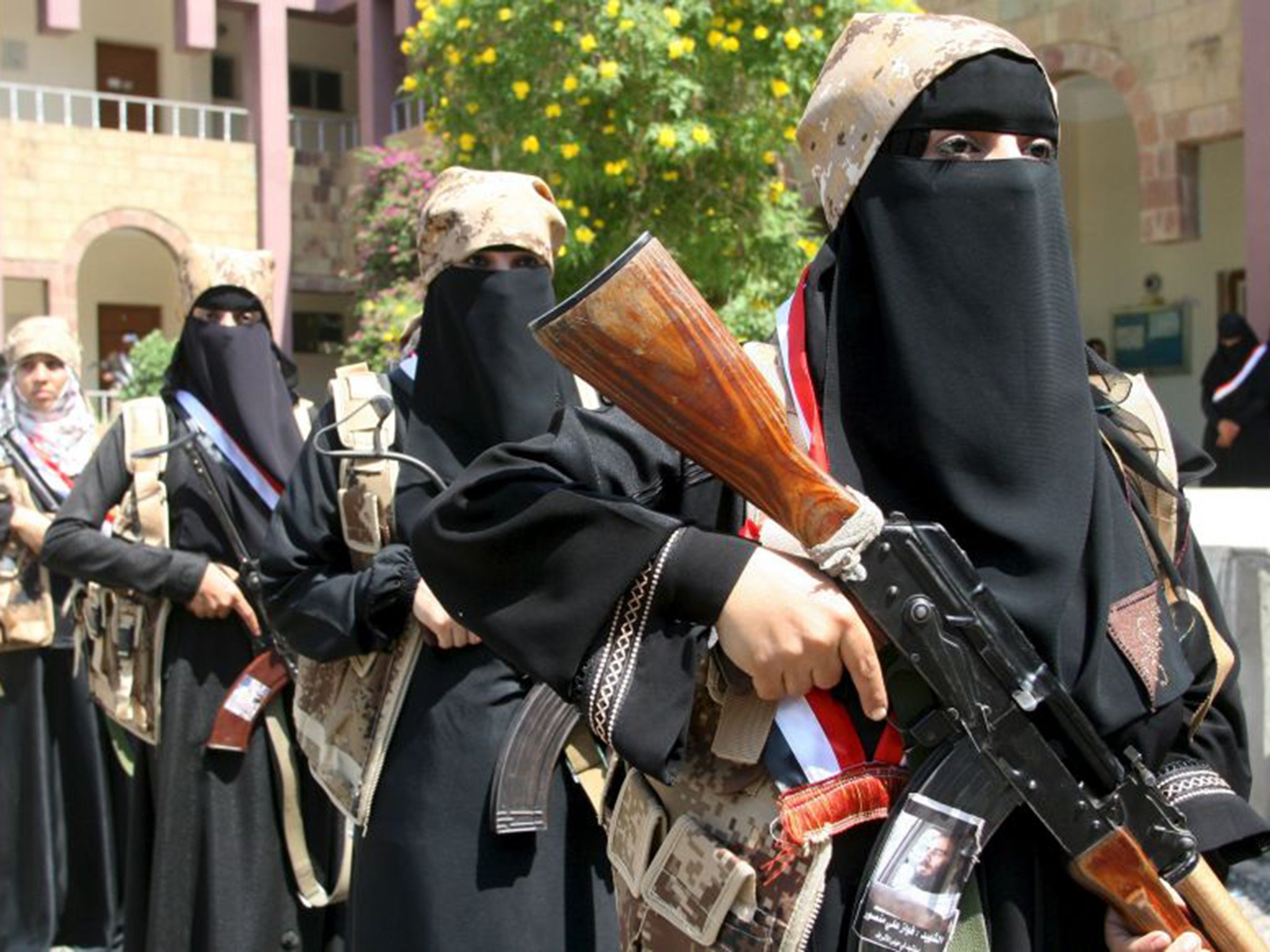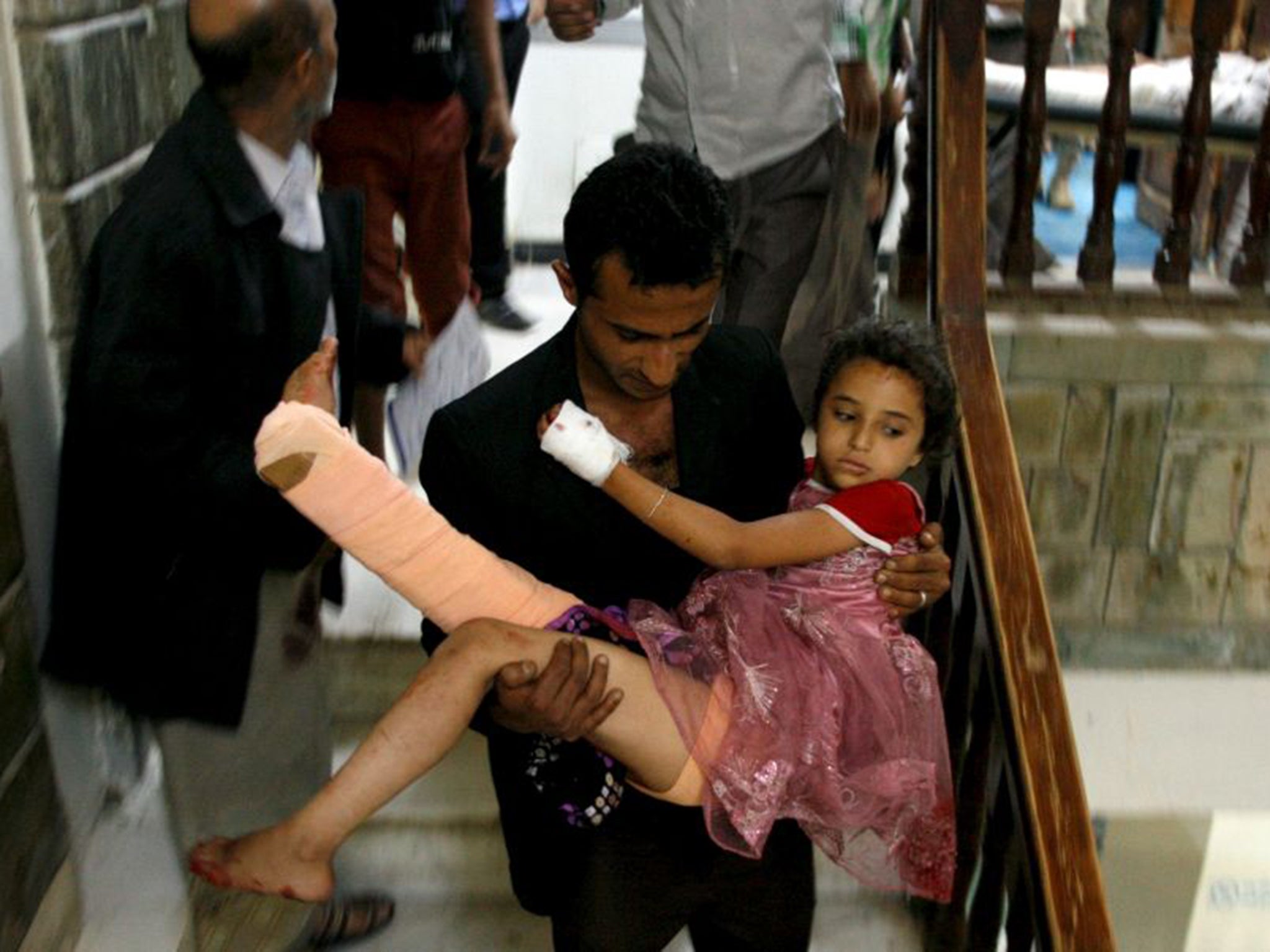Yemen conflict: How al-Qaeda is thriving in the nation’s civil war
Exclusive: In the besieged city of Taiz, the Islamists are uniting to fight Houthi rebels

Your support helps us to tell the story
From reproductive rights to climate change to Big Tech, The Independent is on the ground when the story is developing. Whether it's investigating the financials of Elon Musk's pro-Trump PAC or producing our latest documentary, 'The A Word', which shines a light on the American women fighting for reproductive rights, we know how important it is to parse out the facts from the messaging.
At such a critical moment in US history, we need reporters on the ground. Your donation allows us to keep sending journalists to speak to both sides of the story.
The Independent is trusted by Americans across the entire political spectrum. And unlike many other quality news outlets, we choose not to lock Americans out of our reporting and analysis with paywalls. We believe quality journalism should be available to everyone, paid for by those who can afford it.
Your support makes all the difference.Mohammed Derham, a 50-year-old shop keeper in Taiz, a war-torn city in the Yemeni Highlands, had just finished reading his Koran when the rocket struck.
Walls collapsed overhead; twisted steel rods and cement chunks mingled with bodies of seven female relatives, including his two daughters. “In the hospital, I saw her brains,” he said of his daughter Somaiya, 17. He he did not recognise Mariam, 15, his other daughter, until “the head was found two hours later”. Mr Derham is one of hundreds of thousands trapped in Taiz by a blockade of Shia Houthi rebels.
Yemen’s most densely populated city has become a crucible of the war between the Houthis, troops loyal to former president Ali Abdullah Saleh, and a coalition of the resistance, almost half of which are Sunni Salafists. The resistance in Taiz, close to the Red Sea’s Mocha port, includes an al-Qaeda branch which is now practising “integration” with other factions. By the summer the resistance had pushed the Houthi rebels from the centre of the city, only prompting Houthis to tighten the blockade.

In Souk al-Samil, the district of Taiz where al-Qaeda rules, men with long beards guard checkpoints. “They warn us of al-Qaeda but in fact they are much better than Houthis,” said one resident. “At the very least, we move freely unlike the days under Houthis.” He said that he witnessed an execution of a man accused of “witchcraft” by al-Qaeda militants in the district.
The conflict has deeply polarised Yemen, splitting it along sectarian, regional and tribal lines. On one side is President Abd Rabbu Mansour Hadi and his backers in the Saudi coalition, on another the Shia Houthi movement and elements still supporting former president Saleh.
Welcomed into the resistance against the Houthis is al-Qaeda. Nabil Wasil, the top Salafist commander of the resistance in Taiz, said that Salafists form around 40 per cent of the resistance and that they are the second largest after Yemen’s Islamist Islah party. He said that the al-Qaeda faction has been battling Houthis alongside the rest of the resistance.
He said that the number of al-Qaeda militants is around 50 and what worries him is the “random killing”. “Now the enemy is one [the Houthis],” he told The Independent. “Al-Qaeda, like all of us, have one goal: to fight this enemy. All the factions are united. We [Salafists] have a revenge with the Houthis.”
Mr Wasil was referring to battles in northern Yemen between Salafists and Houthis that ended with the Houthis’ expulsion of a Salafist community last year. He said that while all resistance groups answer to tribal leader Hamoud al-Mekhlafi, al-Qaeda militants answer to the group’s leader Qassim al-Rimi, controlling areas in the city centre. Speaking to The Independent, Mr al-Mekhlafi said that he is fighting with only 10 per cent of his force’s capacity due to lack of weapons, ammunition and funds.
Al-Qaeda will find itself isolated if it tries to impose its hardline ideology on society here
The al-Qaeda commander of Taiz, Harith al-Ezzi, says al-Qaeda is mainly concentrated in Souk al-Samil, where they are in control of key state institutions such as taxes and security headquarters. He said that the group’s leaders are following a different strategy of “integration” with the rest of the resistance across the country without making public announcements, so not to affect the flow of weapons and money going towards the resistance.
“This is the strategy of the sheikhs and they know the good and the evil,” the young commander told The Independent. He said that the resistance abstains from giving his group weapons except for “few Kalashnikovs”.
“We have our own sources of money and weapons, mostly from those seized from Houthis,” he said, adding “the resistance is fearful of giving us weapons for fear that we become stronger”. Meanwhile he said, “we supported the resistance with fighters.”
Many buildings in Taiz are gutted, with shattered windows and walls with shell holes. The city falls into darkness during lingering power outages when fuel bound for the power stations has been prevented from entering. Women smuggle in small quantities of supplies past the Houthi barricade in their private cars, along with medicine and food supplies.
Even if the Houthi are defeated, there may be more suffering for many of the city’s residents. Harith al-Ezzi said that the state buildings under the control of al-Qaeda will only be handed over to those implementing Sharia law. “If the resistance doesn’t implement Islamic Sharia, we will keep what we have in our hands,” he said. But Osama Salama, a young activist, said: “Taiz is a modern civilized city that won’t accept radicals. We have no doubt that al-Qaeda will find itself isolated if it tries to impose its hardline ideology on society here.”
Join our commenting forum
Join thought-provoking conversations, follow other Independent readers and see their replies
Comments